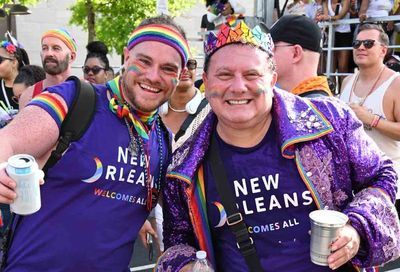Kentucky Families of Trans Youth Sue to Block Health Care Ban
Lawyers representing seven families with trans youth ask a federal judge to block Kentucky's ban on gender-affirming care from taking effect.

The families of seven transgender youth from Kentucky at the heart of a lawsuit challenging the state’s recently passed ban on gender-affirming health care have asked a federal judge to block the law from taking effect.
Earlier this week, the ACLU of Kentucky, which is representing the plaintiffs along with the National Center for Lesbian Rights, filed for a preliminary injunction to block the state from enforcing the ban, set to take effect on June 29, until their case is resolved in court.
The bill in question, SB 150, has been slammed by LGBTQ advocates as one of the worst bills targeting the transgender community, in part due to its provisions that extend well beyond the realm of transgender health care.
In addition to banning gender-affirming medical care for minors, it restricts what bathrooms students may use in schools, limits the scope of sex education to exclude LGBTQ-related topics or information on sexually transmitted diseases, and allows school administrators, employees, and students to misgender trans-identifying minors. None of those other provisions have been challenged in court.
The plaintiff families sued last month, alleging the law’s provisions barring transgender minors from accessing gender-affirming treatments infringe on their parents’ right to autonomy in terms of how they choose to raise and make medical decisions for their children and on the youths’ right to equal protection under the law.
Corey Shapiro, the legal director for the ACLU of Kentucky, said in a statement that the families “should be able to begin or continue essential medical care” for their children, arguing that the law is an egregious form of government overreach into personal family decisions.
They also argue that it is inconsistent with leading medical organizations’ recommendations for treating children suffering from gender dysphoria.
“Banning medically necessary care for trans youth is not supported by science or reputable major medical organizations,” Shapiro said. “These are merely political attacks from groups with a fundamental opposition to transgender people being able to live openly, freely, and affirmed as who they really are.”
In the motion requesting the injunction, the ACLU of Kentucky and NCLR argue that without a court order, the state’s ban on gender-affirming treatments will cause “irreparable physical and mental harm” to transgender youth and their parents.
“Minor Plaintiffs currently receive this medically necessary treatment, and their health and wellbeing will be irreparably damaged if the Commonwealth forces their treatment to stop,” the motion reads. “Further, Parent Plaintiffs, who already carefully determined that this care is necessary for their children, will be forced to watch their children suffer from an entirely preventable denial of care.”
The motion also details specific individual harms that will befall each of their clients if they are prohibited from accessing gender-affirming care. For instance, the parents of one transgender boy “immediately noticed a positive change in his mental health” after their son started receiving hormone therapy, but worry that the ban — coupled with the uncertainty of whether they’d be able to obtain out-of-state care for him — will cause “his symptoms of distress” to return.
According to the Kentucky Lantern, Kentucky Attorney General Daniel Cameron, a Republican, filed a motion last week to intervene in the case to defend the law, which Republican lawmakers passed by overriding a veto from Democratic Gov. Andy Beshear.
“The United States Constitution does not guaranty a right to receive a particular treatment for gender dysphoria in children, nor does it prevent the Commonwealth from regulating medical practices it has determined are harmful,” Cameron stated in his motion to intervene. “Section 4 of Senate Bill 150 furthers the General Assembly’s substantial and compelling interest in protecting children.”
Twenty-two organizations representing various medical groups and healthcare professionals, have filed a motion seeking permission to submit an amicus brief supporting the plaintiffs.
“Amici are professional medical and mental health organizations seeking to ensure that all adolescents, including those with gender dysphoria, receive the optimal medical and mental health care they need and deserve,” the groups’ motion reads.
“Amici represent thousands of healthcare providers who have specific expertise with the issues raised in this brief. The Court should consider amici’s brief because it provides important expertise and addresses misstatements about the treatment of transgender adolescents.”
Support Metro Weekly’s Journalism
These are challenging times for news organizations. And yet it’s crucial we stay active and provide vital resources and information to both our local readers and the world. So won’t you please take a moment and consider supporting Metro Weekly with a membership? For as little as $5 a month, you can help ensure Metro Weekly magazine and MetroWeekly.com remain free, viable resources as we provide the best, most diverse, culturally-resonant LGBTQ coverage in both the D.C. region and around the world. Memberships come with exclusive perks and discounts, your own personal digital delivery of each week’s magazine (and an archive), access to our Member's Lounge when it launches this fall, and exclusive members-only items like Metro Weekly Membership Mugs and Tote Bags! Check out all our membership levels here and please join us today!


























You must be logged in to post a comment.